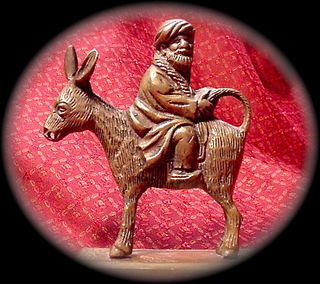Over the past couple of decades, I've ended up on the losing side of philosophical and pedagogical run-ins with scholars, academics, and students who are trying to learn scholarly, academic ways. I inevitably manage to lift my spirits by reading and re-reading this essay by Idries Shah.

Idries Shah writes about Sufis, who are to Islam roughly what Zen practitioners are to Buddhism: out and out fools and borderline apostates. Sufis and Zen masters teach with comedy, fun, slapstick, irreverence, and paradox—all of which have for aeons been anathema to the world of serious scholarship and academia.
The Story of Ajmal Hussein and The Scholars
Sufi Ajmal Hussein was constantly being criticized by scholars, who feared that his repute might outshine their own. They spared no efforts to cast doubts upon his knowledge, to accuse him of taking refuge from their criticisms in mysticism, and even to imply that he had been guilty of discreditable practices. At length he said:
‘If I answer my critics, they make it the opportunity to bring fresh accusation against me, which people believe such things. If I do not answer them they crow and preen themselves, and people believe that they are real scholars. They imagine that we Sufis oppose scholarship. We do not. But our very existence is a threat to the pretended scholarship of tiny noisy ones. Scholarship long since disappeared. What we have to face now is sham scholarship.’
The scholars shrilled more loudly than ever. At last Ajmal said:
‘Argument is not as effective as demonstration. I shall give you an insight into what these people are like.’
He invited ‘question papers’ from the scholars, to allow them to test his knowledge and ideas. Fifty different professors and academicians sent questionnaires to him. Ajmal answered them all differently. When the scholars met to discuss these papers, at a conference, there were so many versions of what he believed, that each one thought that he had exposed Ajmal, and refused to give up his thesis in favor of any other. The result was the celebrated ‘brawling of the scholars.’ For five days they attacked each other bitterly.
‘This,’ said Ajmal, ‘is a demonstration. What matters to each one most is his own opinion and his own interpretation. They care nothing for truth. This is what they do with everyone’s teachings. When he is alive, they torment him. When he dies they become experts on his works. The real motive of the activity, however, is to vie with one another and to oppose anyone outside their own ranks. Do you want to become one of them? Make a choice soon.'
Idries Shah

Thanks for sharing this, Kate! I don’t clash with scholars in my everyday life, but I think this can apply to most criticism.
Hugs,
Francisco
Cool, Francisco, and Bingo! The principle of naming and implicating self-important critics—disclosing their follies—does indeed translate across professions and situations. Thanks for pointing it out. Good food for thought. xo Kate
I loved your presentation at SUNY Purchase today. I was upset because I wasn’t able to talk to you in person to thank you for writing 101 Alternatives to Suicide, that book saved my life.
Hey there Kate!
I too enjoyed your presentation at SUNY Purchase yesterday evening. I would have liked to thank you for sharing all that you did in person, but I have to admit, I was far too shy. With any luck our paths will cross again one day and I hope to be just as inspired then as I was last night. One thing that really resonated with me was when you said that there are rules for no matter what you classify yourself as, and the rules will inevitably make you feel shitty about yourself. I’ve wasted too much time following those rules. Maybe it’s time for this little straight girl from NYC to rebel a little bit…finally. Anyway- stay sexy and remember- Smile and say orgasm!! thanks again!
Hi Kate, I hope you don’t mind my leaving a comment here, I couldn’t find any other way of contacting you.
I’ve been following you on Twitter, and I have a vague recollection about a tweet from you not so long ago regarding a book about reclaiming Shabbat and making it a day for yourself. (I really hope that’s right, I’m going to feel awfully silly if it’s not!) Anyway, it sounded like a really interesting book but I completely forgot to write down the title and I have no idea now what it was called. If you could let me know, I would be most grateful. Thank you so much!
Nathaniel
I like your site. It seems nice. 🙂 continue ! ^^ Erwan
Kate,
When I try to subscribe to your lovely blog, I get your performance schedule instead. What to do? Are you aware of this glitch? It could just be something I did in my relative technological un-savviness.
love,
kody (we met at new college of florida. hi!)
Hi Kate, love your work!
I’m in Australia doing a Phd on gender fluid representation in visual art.
I’m coming to the states amongst other places on a research trip… are you appearing anywhere in November/December 2009? I’d love to see you speak or catch up for coffee or paint your portrait…whatever you’re comfortable with.
a long shot I know, but if you don’t ask you don’t know
cheers, Matt Jackson